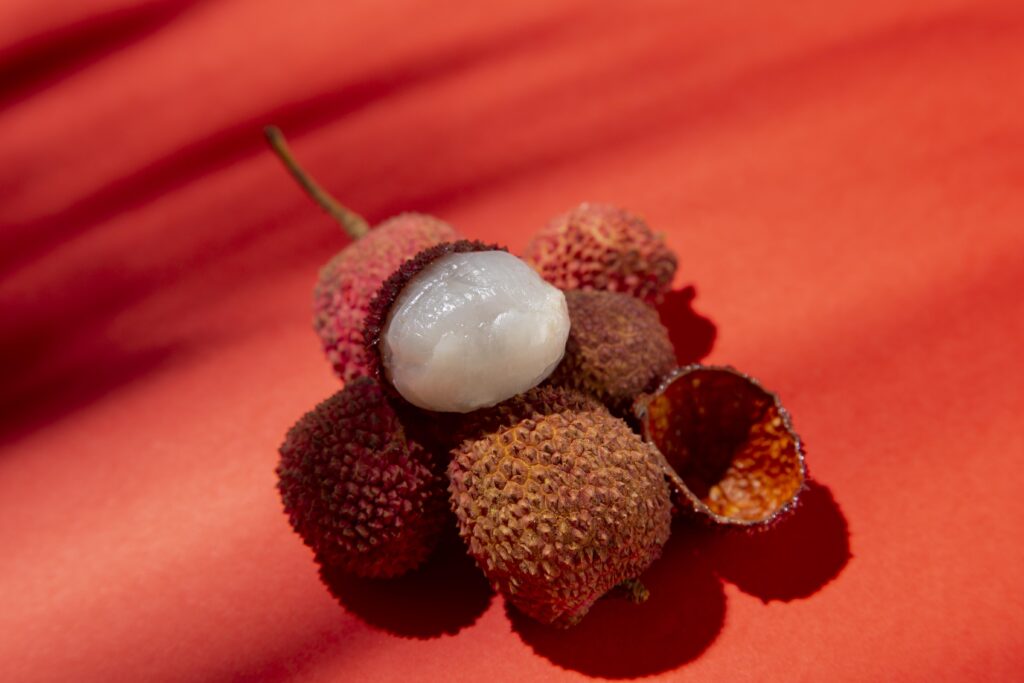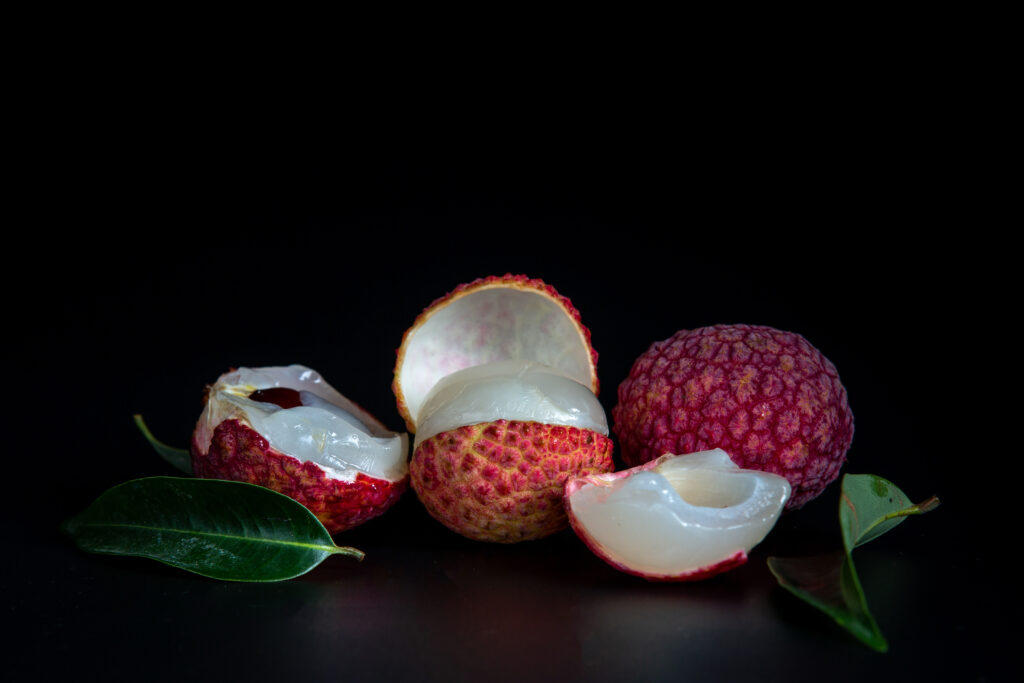Table of Contents
Leechee, popularly known as Litchi chinensis, is a hot tropical fruit known for its sweet, juicy, floral taste and many health benefits. With its raw, red outer skin and delicious, aromatic goodness, leech is not only a delicious dish, but also a powerhouse of nutrition. However, like any food, it comes with possible side effects about which the eater should be aware. It reveals the lychee benefits and side effects in its pure form, which provides the necessary information for you to enjoy the fruit safely and effectively.
Do you want to lose weight or do you want to include fruits and dry fruits in your diet? To know their health benefits, you will definitely read these posts.

🌿 Nutritional Profile of Lychee
Lychee is packed with essential vitamins, minerals, and antioxidants, making it a valuable addition to a balanced diet. According to nutritional data, a 100-gram serving of fresh lychee provides:
- Calories: 66 kcal
- Carbohydrates: 16.5 grams
- Protein: 0.83 grams
- Fat: 0.44 grams
- Fiber: 1.3 grams
- Vitamin C: 71.5 mg (approximately 79% of the daily value)
- Copper: 0.148 mg
- Potassium: 171 mg
- B vitamins (such as niacin, riboflavin, and folate) in smaller amounts.
Lychee benefits and side effects is also rich in polyphenols, including epicatechin and rutin, which are potent antioxidants. These compounds help combat oxidative stress and inflammation, contributing to overall health.
📊 Table: Lychee Nutritional Facts (Per 100g Serving)
| Nutrient | Amount | % Daily Value |
| Calories | 66 kcal | 3% |
| Carbohydrates | 16.5 g | 6% |
| Sugar | 15.2 g | N/A |
| Fiber | 1.3 g | 5% |
| Vitamin C | 71.5 mg | 79% |
| Copper | 0.148 mg | 16% |
| Potassium | 171 mg | 5% |

💪 Health Benefits of Lychee
1. Boosts Immune Function
Lychee benefits and side effects in lychee is an excellent source of vitamin C, a nutrient crucial for immune health. Vitamin C stimulates the production of white blood cells, enhances the body’s defense mechanisms, and reduces the duration of common infections like the cold. Consuming 100 grams of lychee provides nearly 80% of the daily recommended intake of vitamin C, making it a strong ally for maintaining a robust immune system.
2. Supports Heart Health
Lychee benefits and side effects research suggests that lychee may benefit heart health by reducing blood pressure and improving cholesterol levels. The phenolic compounds in lychee inhibit an enzyme (angiotensin-converting enzyme) that regulates blood pressure, potentially lowering hypertension risk. Animal studies have shown that lychee pulp can reduce LDL (“bad”) cholesterol and increase HDL (“good”) cholesterol, thereby supporting cardiovascular function.
3. Enhances Skin and Hair Health
The high vitamin C content in lychee promotes collagen production, which is essential for maintaining skin elasticity and hair strength. Collagen helps repair skin damage, reduces wrinkles, and protects against UV-induced harm. Additionally, improved blood circulation from lychee consumption may reduce hair loss and encourage regrowth.
4. Aids in Weight Management
Lychee benefits and side effects in lychee is low in calories and contains fiber, which promotes satiety and helps control appetite. Some studies indicate that lychee seed extract may inhibit pancreatic lipase, an enzyme involved in fat absorption, potentially aiding in weight management. However, more human research is needed to confirm this effect.
5. Provides Antioxidant and Anti-Inflammatory Effects
Lychee is loaded with antioxidants, including polyphenols and polysaccharides, which neutralize free radicals and reduce oxidative stress. This may lower the risk of chronic diseases like cancer, diabetes, and heart conditions. In vitro studies have shown that lychee extracts can suppress inflammatory pathways, offering protection against inflammation-related disorders.
6. Supports Liver Health
Polyphenols in lychee may protect the liver from damage caused by toxins or excessive alcohol consumption. Research suggests that lychee extract can reduce fat accumulation in the liver, potentially preventing conditions like alcoholic fatty liver disease this type of many lychee benefits and side effects.
7. Improves Brain Function
Animal studies indicate that lychee seed extract may have neuroprotective properties, potentially improving cognitive function and reducing the risk of neurodegenerative diseases like Alzheimer’s. The saponin compounds in lychee seeds are believed to enhance memory and learning abilities.
8. Regulates Blood Sugar
Though lychee contains natural sugars, its polyphenol content may improve insulin sensitivity and glucose metabolism. Some studies suggest that lychee seed extract can lower blood sugar levels, but more research is needed to confirm this effect in humans. The fruit’s low glycemic index (GI) means it has a minimal impact on blood sugar when consumed in moderation is the lychee benefits and side effects.
9. Fights Cancer Cells
In vitro studies have demonstrated that lychee extracts can inhibit the growth of cancer cells, including those associated with breast, lung, liver, and prostate cancers. The antioxidants in lychee, such as oligonol, may induce apoptosis (cell death) in cancerous cells, though human trials are necessary to validate these findings.
10. Promotes Digestive Health
Lychee contains dietary fiber, which aids digestion by promoting regular bowel movements and preventing constipation. Additionally, traditional medicine systems like Ayurveda use lychee to strengthen the digestive system and improve appetite this type of many lychee benefits and side effects describe in the below.

⚠️ Potential Side Effects and Precautions
Despite lychee benefits and side effects, lychee consumption may pose risks in certain situations. Here are the key side effects and precautions to consider:
1. Allergic Reactions
Llychee benefits and side effects in some individuals may be allergic to lychee, especially those with sensitivities to birch, mugwort, sunflower seeds, or latex. Symptoms can include:
- Skin itching, rash, or hives
- Swelling of the lips, tongue, or throat
- Difficulty breathing
In severe cases, anaphylaxis may occur. If you experience any allergic symptoms, seek medical attention immediately.
2. Hypoglycemia (Low Blood Sugar)
Lychee contains compounds like hypoglycin A and methylene cyclopropyl glycine (MCPG), which can cause a sudden drop in blood sugar levels. This is particularly risky for malnourished children or individuals who consume unripe lychees on an empty stomach. In rare cases, it may lead to brain inflammation or seizures. To avoid this, eat lychee in moderation and ensure it is ripe.
3. Drug Interactions
Lychee may interact with certain medications:
- Diabetes drugs: Lychee extract can lower blood sugar, potentially leading to hypoglycemia when combined with insulin or oral hypoglycemic agents.
- Blood thinners: Lychee may increase the risk of bleeding when taken with anticoagulants like warfarin or aspirin.
- Immunosuppressants: Lychee can stimulate the immune system, reducing the effectiveness of immunosuppressive drugs.
4. Auto-Immune Diseases
Lychee might overstimulate the immune system, worsening symptoms of auto-immune conditions like lupus, rheumatoid arthritis, or multiple sclerosis. Individuals with these disorders should consume lychee cautiously.
5. Pregnancy and Breastfeeding
There is insufficient evidence on the safety of lychee during pregnancy or breastfeeding. While consuming it in food amounts is likely safe, consult a healthcare provider before using lychee supplements or extracts.
6. Gastrointestinal Issues
Overconsumption of lychee you think tou consume lychee benefits and side effects are start like loose motions or diarrhea due to its high fiber and sugar content. Stick to moderate servings to avoid digestive discomfort.
🍽️ How to Incorporate Lychee into Your Diet
Lychee can be enjoyed in various ways and consume lychee benefits and side effects not start in your body:
- Fresh: Peel the skin, remove the seed, and eat the flesh raw.
- Beverages: Blend lychee into smoothies, juices, or cocktails.
- Salads: Add lychee to fruit or vegetable salads for a sweet twist.
- Desserts: Use lychee in sorbets, ice creams, or cakes.
- Canned or Dried: Opt for versions without added sugar to maximize health benefits.
Key Takeaways from Health-Icon.com
- Benefits: Lychee is rich in vitamin C, antioxidants, and other nutrients that support immunity, heart health, skin health, and more.
- Side Effects: Allergies, hypoglycemia, and drug interactions are potential risks. Consume in moderation and avoid unripe fruit.
- Precautions: Pregnant women, children, and individuals with medical conditions should consult a doctor before adding lychee to their diet.
🔚 Conclusion
Lychee is a nutritious fruit with numerous health benefits, from boosting immunity to supporting heart health. However, it is essential to consume it mindfully to avoid potential side effects. At Health-Icon.com, we recommend enjoying lychee as part of a balanced diet consume lychee benefits and side effects not start in your body and we advise consulting a healthcare professional if you have underlying health conditions or concerns. By doing so, you can safely reap the rewards of this exotic tropical fruit.
Disclaimer: The information provided on this website is for general educational and awareness purposes only. It should not be considered a substitute for professional medical advice, diagnosis, or treatment. Always consult your doctor or a qualified healthcare professional before making any changes to your diet, medication, or health routine. The author and website are not responsible for any outcomes resulting for the use of this information.
FAQs
What are the top 3 health benefits of eating lychee?
Lychee is a nutritional powerhouse, but three standout benefits include its immense immune boost from Vitamin C, its heart-healthy properties from polyphenols that may improve cholesterol and blood pressure, and its skin-enhancing abilities by promoting collagen production for elasticity and repair.
Can lychee cause low blood sugar (hypoglycemia)?
Yes, this is a rare but important side effect. Unripe lychees contain natural toxins (hypoglycin A and MCPG) that can cause a sudden drop in blood sugar, especially in malnourished children or if eaten in large quantities on an empty stomach. To avoid this, always consume fully ripe lychees in moderation as part of a meal.
Are there people who should avoid lychee?
Certain individuals should be cautious. Those with known allergies to similar fruits or latex, people with diabetes on medication (due to its blood sugar-lowering potential), individuals on blood thinners, and those with autoimmune diseases should consult a doctor before adding significant amounts of lychee to their diet.
How many lychees can I safely eat in a day?
For most healthy adults, a moderate serving of 10-12 fresh, ripe lychees per day is considered safe and allows you to gain the benefits without overconsuming sugars or risking potential side effects. As with any food, balance is key.
Does recommend lychee for weight loss?
Lychee can be a helpful part of a weight management plan because it is low in calories and contains fiber, which promotes feelings of fullness. However, due to its natural sugar content, we at recommend enjoying it in moderation as a healthy substitute for processed sweets, not as a primary weight loss tool.
6 thoughts on “Lychee Benefits and Side Effects”